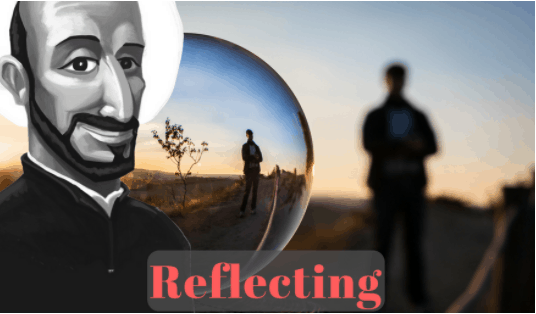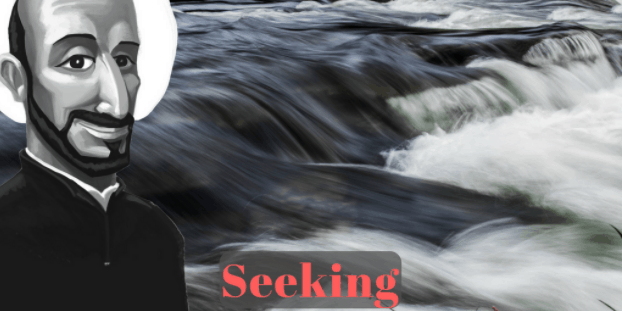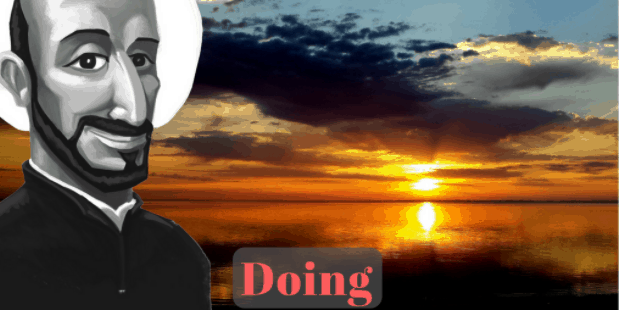Ignatius lived over five hundred years ago in a time before computers, before cars, before the steam engine, before the Enlightenment and the French Revolution. The printing press had been invented, but literacy was practically nonexistent. It was a time of nobles, knights, Christendom, legends, and castles…
All of which sounds terribly nostalgic and impossibly different from the world in which we live. The world of Ignatius Loyola seems more akin to Cervantes’s Don Quixote with the wild and comic figure of a knight, than the day-to-day monotony of cars, electricity, computers, and social media.
Our world seems messier than Ignatius’s, the battle lines are not clear and often I’m not sure who the ‘good guys’ are. Where Ignatius waited months for letters, I can find news, tweets, messages, snapchats from across the globe instantly delivered to the palm of my hand. It’s an entirely different world where I acutely feel the reality of my access to incalculable and inexhaustible information. I have unbounded potential, bounded within my own indeterminate direction… And, I don’t think I’m alone in this feeling.
“Wanderlust” is a bit of strange word to discuss, especially in the abstract terms of our modern realities in 2017. Literally, wanderlust refers to the strong desire to travel, but it can also refer to a desire not to stay still—a desire, insatiable and greater than your very heart can hold.
This term describes a fundamental tension in which many young adults live. There is a desire—screaming within us—to do something meaningful and big: “I can do it, and I can make a difference!” Which simultaneously echoes with the slight whisper which fills the air: “…But what do I do? What can I do?”
Lev Grossman’s The Magicians captures this feeling well: “Too many magicians, not enough monsters.” The quotation expresses the infinite possibility held in tension with a question of direction. There is a desire to prove oneself, but at the same time there is an emptiness, a question: “What am I supposed to do?”
Yet, for all the modernness of these feelings, Ignatius felt it 500 years ago. His autobiography can best be described as a wandering journey, a pilgrim’s tale. It’s because of this that Ignatius might have a special insight as to the millennial struggle. What worked to quench Ignatius’s wanderlust?
Our pilgrim wanderer lays out a program of finding our path: reflecting, seeking, and then doing.

With tweets, snapchats, facebook, email, and texts—let’s face it: our world moves fast. Often, the speed at which the world turns can leave us spinning. If we could slow the world down, then perhaps we could pause and determine what is good or bad for us. Sadly, that isn’t a realistic option.
Instead of the impossible, Ignatius offers a short daily practice called the Examen. The purpose of the prayer is to reflect upon those good things and good moments in such a way as to cultivate gratitude. And, in the same way, to notice those places which need a little attention or growth for the next day. Reflecting upon these things, we simultaneously cultivate gratitude and see the areas in our life which need growth.
This practice of reflection, even in the midst of the chaos of our modern lives, offers us a chance to get in touch with ourselves—to understand our strengths, failings, and most importantly our desires. Knowing these things about ourselves helps us to realize what we should seek.

Ignatius doesn’t stop at reflection, he aims us towards more. He says we should seek those good things, and especially seek those deep movements and desires which pull us outward. We should seek deep consoling encounters that last, not simply the fleeting moments of self absorption or immediate gratification.
These deep encounters and desires which we seek and cultivate are more like rivers than fireworks. Where fireworks might explode leading to the “ooh and aah” which carries us away momentarily, a river slowly pulls us towards something greater than ourselves. We experience these currents within us. They are the things which splash out in our genuine laughter and joy, but they are also the things which press out on all sides—leading us to the feelings of wanderlust and insatiability.
So Ignatius says that we should seek those deeper movements, those things of love, depth, and grace. By seeking what we love, we find meaning. As Fr. Pedro Arrupe, SJ, once said:
What you are in love with, what seizes your imagination, will affect everything. It will decide what will get you out of bed in the morning, what you do with your evenings, how you spend your weekends, what you read, whom you know, what breaks your heart, and what amazes you with joy and gratitude. Fall in Love, stay in love, and it will decide everything.
Once we seek and find this love: What are we to do?

Ignatius answers that our restlessness and wanderlust can only be appeased by turning those things which we love over to others. That infinite capability and potential which we feel wrestling within our chest should be directed out from ourselves—towards God and others.
Ignatius himself discovered this method of discernment when he was bedridden at Loyola castle. After prayer, reflection, and seeking, Ignatius could barely hold himself still. He erupted from the castle to the road, wandering as a pilgrim and sharing his love and joy with others. It’s in this context that Ignatius makes the claim: “Love is shown more in deeds than in words.”
Deeds—sparked from our love and genuine passions—offer us a way to quench our wanderlust. This outpouring of self doesn’t so much as empty ourselves as fill us with purpose. Those deeds of love allow us to express ourselves, and even further, to become echoes of the very depths of our souls. Instead of holding within the ricocheting: “I can make a difference!… but what can I do?”, we become those dreams which were never realized.
We cannot contain those dreams, and yet we feel them rattling within our very bones. It seems like a modern problem—and perhaps it is—but a pilgrim saint confronted his wanderlust over 500 years ago. So what would Ignatius have us do with our wanderlust?
Ite, inflammate omnia … “Go, set the world on fire.” — Ignatius Loyola
-//-